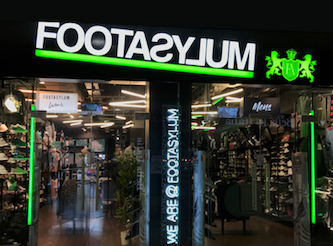The UK’s Competition and Markets Authority (CMA) said on Wednesday it has blocked the purchase of Footasylum by JD Sports Fashion after finding it “would leave shoppers worse off.”
The CMA said it decided “the only way to address the competition concerns is for JD Sports to sell Footasylum, in full, to an approved buyer.”
Bury-based retail giant JD Sports said in March last year it agreed to acquire Rochdale-based Footasylum in a deal valued at up to £90.1 million.
JD Sports said on Wednesday it “fundamentally disagrees” with the CMA decision.
” … we firmly believe that the CMA has failed to meet its objective of protecting consumer interests and today’s decision will be detrimental for Footasylum, its customers, its 2,500 staff and the UK sports retail market as a whole.
“We are carefully considering whether to make an application to the Competition Appeal Tribunal to review this decision.”
JD Sports Fashion CEO Peter Cowgill said: “We fundamentally disagree with the CMA’s decision, which continues to rely on an inaccurate and outdated analysis of the UK sports retail competitive landscape, and is underpinned by outdated and flawed customer surveys.
“At the same time, incredibly, the CMA has been taken in by the self-serving testimony of one notoriously vocal competitor, who has made numerous public announcements confirming their ongoing investment in their elevation strategy and who has blatantly participated in the process for their own commercial interests rather than for the benefit of consumers.
“When the CMA published its provisional findings in February, we said at the time that they demonstrated a complete misunderstanding of our market to an alarming extent.
“Today, and equally frustratingly, in the midst of a global pandemic and with the UK high street in a state of complete lockdown, the CMA’s final decision is even more absurd.
“Since the CMA launched its review 12 months ago, the competitive landscape in which we operate has changed beyond recognition.
“Further, since the outbreak of COVID-19, competition has not lessened; it has become even more intense as the consumer transition to online has accelerated at a meteoric rate.
“We are astounded that the CMA has failed to recognise that this isn’t just a short-term blip, but rather a long-term societal and behavioural change in how consumers shop.
“As physical stores have closed in line with Government guidance, consumers have shifted their spending exclusively online, where Footasylum is an insignificant player in the context of the overall market and heavily dependent on its store estate.
“The clear evidence from China and other European markets is that, when current lockdown measures are lifted, it is virtually certain that footfall levels will not return to pre-crisis levels.
“This outcome would disproportionately impact smaller retailers like Footasylum, whose stores and shopping centre outlets rely so heavily on concentrated footfall and high trading densities.
“It is therefore extraordinary for the CMA to now require the divestment of Footasylum, in full knowledge of the impact that COVID-19 has had on its operations and, indeed, the retail industry as a whole.
“In this regard, we must face the fact that there is a significant probability that a prospective purchaser could look to substantially reduce Footasylum’s central operations, resulting in a considerable loss of jobs, particularly in the North West of England, which is entirely at odds with the Government’s current strategy.
“When the Group made its offer in March 2019, it was our intention to fully support Footasylum and its employees to grow the business and increase the quality, range and choice of products available to customers.
“We still firmly believe that bringing Footasylum into the Group will deliver these significant benefits for both consumers and the UK high street.
“At no time during this process has the CMA considered deviating from its erroneous view of competition in our market, which was determined at a premature stage, and heavily influenced by a snapshot customer survey and the picture presented by a self-interested third party.
“Given the injustice of the CMA’s decision and its disregard of irrefutable evidence of real-world competition, we will now carefully consider whether to formally challenge today’s decision in the Competition Appeal Tribunal.”
